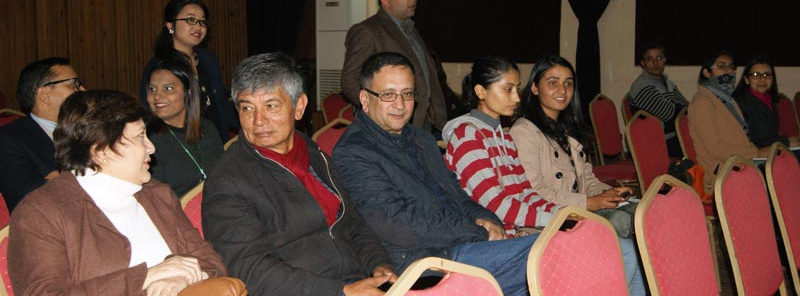
KATHMANDU: One per cent of people above 60 years of age suffer from Parkinson’s disease, a degenerative neurological disorder that affects the central nervous system. But now-a-days, youth are also being diagnosed with the disorder, showed a documentary screened at Moksha in Jhamsikhel.
In the documentary – Living with Parkinson’s Disease – various personalities including veteran actor Madan Krishna Shrestha, and initiator of the project and Parkinson’s disease advocate Banita Khanal, among others, shared their stories, struggles, and experiences living with the degenerative brain disorder.
“When I was young, I used to say I would scale Mt Everest one day. But I was diagnosed with Parkinson’s disease at the age of 26, seven years after suffering from it,” shared Khanal.
The disease shows different symptoms in different persons including difficulty in movement and speaking, trembling, rigidity, postural difficulties, lack of confidence, nervousness, memory loss, loss of taste and smell, among others.
Similarly, actor Shrestha, who has been diagnosed with the disease, shared, “I tried everything from physiotherapy, acupressure to radiotherapy but the symptoms that I had developed did not subside. Later, Dr Sarvottam Shrestha said I was suffering from Parkinson’s.”
“I could not drive, hold a spoon, or even put on shoes. Later a doctor from Japan Dr Takaomi Taira first tried exercises, and when that did not work he suggested I needed a Deep Brain Stimulation (DBS) surgery and installed a pacemaker,” shared Shrestha.
Shrestha also expressed the irony of the situation where being an actor, due to his condition, he finds it challenging to emote and express, as Parkinson’s also affects a person’s ability to show facial expressions. Nevertheless, his positive attitude and humour were intact while sharing his story with the audience.
Likewise, Tilak Sapkota, a Hotel Management teacher who was diagnosed with the degenerative disorder six years ago, shared that the problem started with his hands. “My face gradually started to lose its expressions and people actually started noticing it. My wife took me to a few neurologists. After visiting 3-4 doctors, we came to know that it was Parkinson’s. My wife was my biggest support then.”
Medication, physical exercise, psychological strength, will power, and support from family and friends are the best ways to keep moving, shared the patients.
The documentary also showed how patients visited shamans to understand and find solution to the symptoms they were suffering from because they had not been diagnosed yet, mainly because Parkinson’s disease was not out in the light, not thought to be a condition that could be affecting the population.
But the patients shared how it is real and how they came in terms with their diagnosis. And though the disorder is not reversible, the condition can definitely be treated and controlled with medication. Dopamine and related medicines can help minimise the effects of the disease.
The documentary was followed by a panel discussion with panelists Khanal, Shrestha, Bhavana Rana, Neurologist Dr Baburam Pokharel, Geriatric Physician Dr Ramesh Kandel and Clinical Psychologist Pramesh Man Pradhan.
Medical experts and scientists have been conducting a stem cell research in Australia to find a solution to Parkinson’s.
“The cause of the disorder cannot easily be ascertained. There could be various reasons. Change in the genetics can be one of the causes of the degenerative disease. Apart from that, people who work with pesticides have high chances of suffering from Parkinson’s. Exposure to or consumption of neurotoxin MPTP directly or indirectly could also cause the symptoms to begin. Likewise unadministered use of medications can also be harmful and could at some point of time induce Parkinson’s,” shared Dr Pokharel explaining the possibilities.
“I say Parkinson’s is way better than other neuro-degenerative diseases because at least it can be diagnosed and controlled. Most of the neurological diseases have not been identified yet, forget the treatment,” stated Dr Pokharel.
The panel members also raised the issue of there not being any government facility that would deal with the neurological disorders, where people could go for diagnosis and treatment. This has created further difficulties to the people who suffer from Parkinson’s and other neurological disorders because the private institutions are not only expensive but not really focused on the specific cause. Having a government facility focused on this sector would be extremely helpful.
The panel discussion also shared challenges faced by the family members or caretakers of persons suffering from Parkinson’s. Leading this discussion was Bhavana Rana whose mother has Parkinson’s. She shared with the audience her experience in this regard and how to best take care of a person who is suffering from the disorder, highlighting the importance of being positive and loving towards the patients.
Published on January 21, 2018.



Send us your feedback on this article